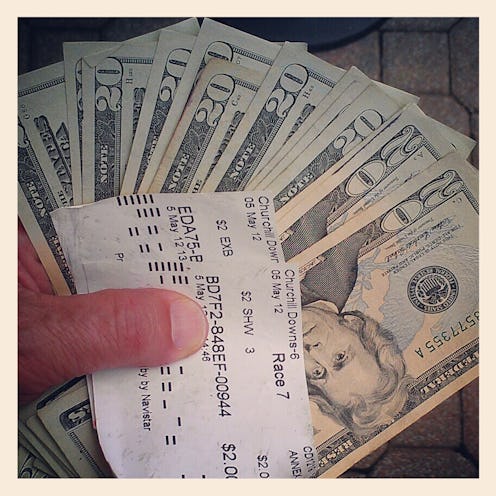News
How Do The Kentucky Derby Payouts Add Up?
For those who'd bet on him, Nyquist's thrilling victory at the Kentucky Derby on Saturday felt like a personal win. Clutching their betting slips close spectators who'd wagered money on the morning line favorite likely found their winner's high cut short when they finally got to the payout window. This year's race reportedly had one of the lowest Kentucky Derby payouts in decades.
This year a $2 exacta bet, which means you wagered Nyquist would finish first and Exaggerator second, paid out $30.60. Payout on a $2 trifecta bet — correctly ordering the first, second, and third place finishers — this year was $173.40 while the $2 superfecta — betting on the exact order of the top four finishers — had a payout of $1,084.20. While that might sound like decent money at first, a quick review of Kentucky Derby history makes it clear this year had some of the most disappointing payouts.
In 2015, the $2 exacta bet had a payout of $72.60 and at the 2014 Kentucky Derby it was $340. Similarly, payout on a $2 trifecta bet was $202.00 in 2015 and $3,424,60 in 2014. The $2 superfecta payout was $1,268.20 at the Derby in 2015 and $15,383.80 in 2014. So, you can see why there was some groaning among gamblers this year.
The biggest payout ever recorded in Kentucky Derby history occurred in 2005 when a $2 dollar bet on Giacomo to win paid out $2,043. A $2 exacta bet on Giacomo finishing first and Closing Argument finishing second resulted in $9,814.80 while a trifecta bet wagering Afleet Alex for third place paid $133,134.80. Anyone lucky enough to place a $2 superfecta bet on Giacomo, Closing Argument, Afleet Alex, and Don't Get Mad walked away with over $1.7 million.
But, as this year showed, not every Kentucky Derby is a guarantee of big money. In 1997, for example, the payout on a $2 exacta bet was $31, just 40 cents more than this year's prize.
So, why were the payouts lower this year than in years past? The answer has to do with horse racing's parimutuel betting system. Under a parimutuel wagering system, betters are betting amongst each other rather than against the track or a "house." Bets placed on a horse are pooled and then shared, meaning that betting on a favorite to win, like Nyquist, often results in a smaller payout because the prize pool must be shared amongst a high number of wagerers.
It seems in horseracing it takes a longshot to win big, money that is.
